What is Case Management Software? Best 10 Case Management Software for 2024
Effective case management is essential for organizations in various industries to streamline processes, enhance productivity, and deliver superior customer experiences. Case management software helps businesses achieve this goal, offering comprehensive solutions to manage cases, track tasks, and collaborate.
In this article, we explore the key features and benefits of case management software, along with an overview of the 10 best solutions available on the market.
What is Case Management Software?
Case management software is a tool designed to streamline and optimize the process of managing the entire lifecycle of a case, from submission to resolution. It serves as a centralized platform where users can efficiently store information and collaborate on cases, ensuring timely and effective case processing.
Case management software typically includes features such as case tracking and routing, documentation management, scheduling, communication tools, and reporting capabilities.
By automating routine tasks, facilitating communication among team members, and providing insights through data analytics, case management software enhances productivity, and helps businesses boost the quality of their customer support.
Core features of a case management system
Case management facilitates case processing and helps organizations deliver exceptional customer service thanks to several key features listed below:
- Case intake - the case intake feature streamlines the process of capturing and recording new cases as they enter the system through customizable forms, email, telephone, SMS, chatbots, etc. The case management system automates data entry and creates new case files.
- Case tracking and management - case management software tracks and manages cases from intake to resolution. This includes recording case details, assigning tasks, and setting deadlines, reminders, and alerts. A centralized dashboard provides users with an overview of all active cases and includes interactive charts, and graphs to monitor case status in real-time.
- Documentation management - effective case management systems provide a centralized hub for storing and managing case-related documents, such as forms, messages, notes, etc.
- Task management - case managers can create and assign tasks to team members, set deadlines, and track task completion status within the software. This ensures that everyone involved in the case is aware of their responsibilities and deadlines.
- Workflow management - workflow management tools enable organizations to design and automate the sequence of tasks and processes involved in handling cases. Users can create predefined workflows with specific steps, triggers, and decision points to guide cases from initiation to resolution more efficiently.
- Communication tools - integrated communication tools, such as email, and chat, enable seamless communication among team members, clients, and external stakeholders. This facilitates collaboration and ensures that everyone is kept informed throughout the case process.
- Scheduling and calendar management - case management software often includes calendar and scheduling functionalities to help users manage appointments, deadlines, and other important events related to cases.
- Access and controls - case management systems incorporate robust access controls and security features to safeguard sensitive information and comply with data privacy regulations. Administrators can define user roles, permissions, and access levels to restrict unauthorized access to confidential data.
- Reporting and analytics - reporting and analytics features provide valuable insights into case metrics, performance indicators, and trends. Users can generate reports to track case outcomes, workload, resource allocation, and other key metrics, helping organizations make data-driven decisions and improve efficiency.
- Integration with other systems - case management systems often integrate with other software applications used within an organization, such as CRMs, accounting software, etc.
Benefits of Case Management Software
Case management software offers multiple benefits to organizations across various industries, revolutionizing how they handle complex cases and manage workflows. These benefits include:
Efficiency and time savings
Case management software automates repetitive tasks, streamlines processes, and centralizes case-related information, saving valuable time and resources. This allows teams to focus on high-priority tasks such as building long-lasting relationships with clients and enhances overall productivity.
Improved organization and accessibility
With centralized storage and data management, case management software ensures that all case-related information is organized and easily accessible. Users can quickly retrieve documents, track case progress, and collaborate with team members from any location, improving responsiveness and case resolution outcomes.
Enhanced collaboration and communication
By providing a platform for real-time collaboration and communication, case management software facilitates seamless interaction among team members, clients, and stakeholders. This reduces communication barriers and improves collaboration throughout the case lifecycle.
Compliance and security
Case management software helps organizations maintain compliance with regulatory requirements and industry standards. Features such as access controls, audit trails, and encryption ensure data security and integrity, reducing the risk of data breaches.
Improved client satisfaction
By streamlining case processes, providing timely responses, and offering transparent communication channels, case management software enhances customer satisfaction. Clients can access case information, track progress, and communicate with their case managers more effectively, leading to greater trust and loyalty.
Scalability and adaptability
Case management software is often scalable and adaptable to meet the evolving needs of organizations of all sizes. Whether handling a small number of cases or managing large-scale operations, top software can be customized and expanded to accommodate growth and changing requirements.
Cost savings
By reducing manual effort, streamlining resource allocation, and improving resource utilization, case management software helps organizations cut costs while driving efficiency and boosting outcomes. The ability to automate repetitive tasks and optimize workflows enables organizations to operate more efficiently, which results in long-term cost savings.
Case management software offers a comprehensive solution for organizations seeking to streamline case management processes, enhance collaboration, ensure compliance, and deliver excellent client service. Its benefits make it an indispensable tool for organizations looking to optimize their operations and achieve better outcomes.
10 Best Case Management Software
In this section, we’re going to introduce 10 leading case management software solutions, providing insights into the features and capabilities of each platform. From comprehensive systems to specialized solutions tailored to legal practices and nonprofit organizations, these software streamline case-handling processes, enhance collaboration, and drive efficiency.
1. Creatio
Creatio offers a comprehensive case management solution seamlessly integrated with the Service Creatio CRM. Its powerful capabilities enable organizations to automate omnichannel customer service workflows of any complexity and enhance customer satisfaction.
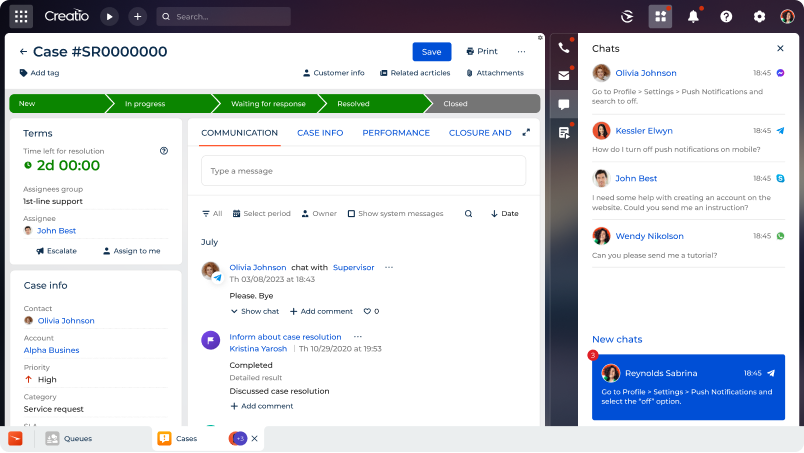
Its intuitive interface and customizable workflows make it easy to manage cases from start to finish. With features such as automated case registration, AI-based case routing, classification, and resolution workflows, Creatio helps businesses manage case requests of any type. Thanks to consolidated customer and case data views, omnichannel communications, and team collaboration tools, Creatio empowers businesses to deliver exceptional customer service.
Creatio’s customization and configuration capabilities, underpinned by a no-code approach and innovative composable architecture, make it highly adaptable for various industries, workflows and use cases. Thanks to seamless integration with over 700 third-party applications and robust scalability options, the platform capabilities can be expanded, ensuring enhanced functionality and versatility to meet evolving business needs.
Pricing for Service Creatio starts at $40 per user per month. Thanks to a transparent, composable pricing model, users can add specific capabilities and apps as required without inflating the total cost of ownership.

2. Salesforce Service Cloud
Salesforce Service Cloud stands out as a versatile case management software solution, integrated with the Salesforce CRM platform. It offers a comprehensive suite of features tailored to streamline case-handling processes and boost the productivity of customer service agents and field service teams.
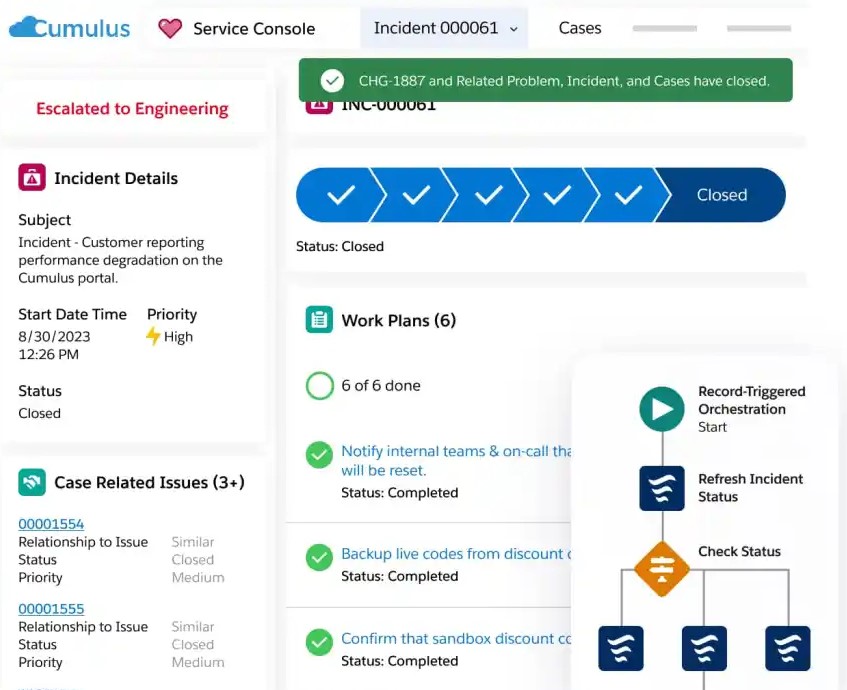
From intuitive case assignment and escalation rules to knowledge base integration, Salesforce Service Cloud provides an AI-powered workspace for organizations to efficiently manage support cases and deliver personalized customer service. Thanks to generative AI-powered service replies it enhances customer satisfaction with replies based on the conversation or data from the company's knowledge base.
Users reported that Salesforce is difficult to set up and use and might even require a professional developer to customize the platform to the business needs. Additionally, the notification feature requires improvement, as it doesn’t always work properly, leaving customers without a response.
With pricing starting at $25 per user per month, Salesforce Service Cloud is an affordable choice for businesses seeking to optimize their service operations. However, additional support and add-ons might increase the costs substantially, so the pricing structure should be thoroughly examined to avoid unpleasant surprises.
3. Zendesk
Zendesk is a case management software solution, renowned for its user-friendly interface and robust functionality. With its intuitive ticketing system, automation tools, and omnichannel support capabilities, Zendesk empowers businesses to streamline case resolution and deliver exceptional customer service experiences.
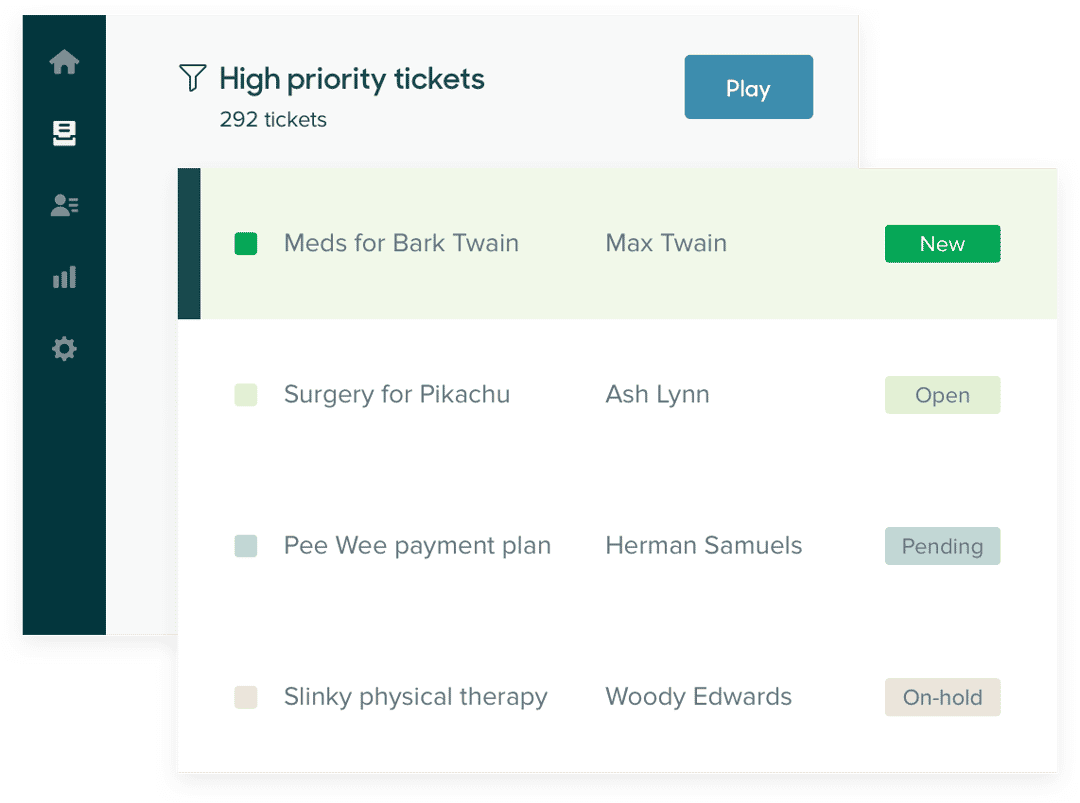
Whether managing inquiries, tracking issues, or handling support tickets, Zendesk provides organizations with the tools they need to manage cases efficiently. The platforms can be customized to tailor the business needs and integrated with third-party apps to further expand its functionality.
Zendesk provides a help center that allows customers to find the answers to their questions on their own. Thanks to AI and automation capabilities, businesses can automate customer interactions, and solve customer issues faster. With a dedicated workspace, agents can see all customers’ data in one place and use it to personalize conversations across multiple channels. However, according to users, there’s an initial learning curve with setting up and using the platform, and the pricing plans are inflexible, forcing businesses to pay for features they don't use.
With pricing starting at $55 per user per month, Zendesk is a solution suitable for larger businesses and enterprises.
4. Freshdesk
Freshdesk by Freshworks is a comprehensive case management software solution, designed to elevate customer service with AI-driven ticketing. The cloud-based platform offers features such as ticket management, workflow automation, and multichannel support, enabling organizations to deliver timely and consistent support at any scale.
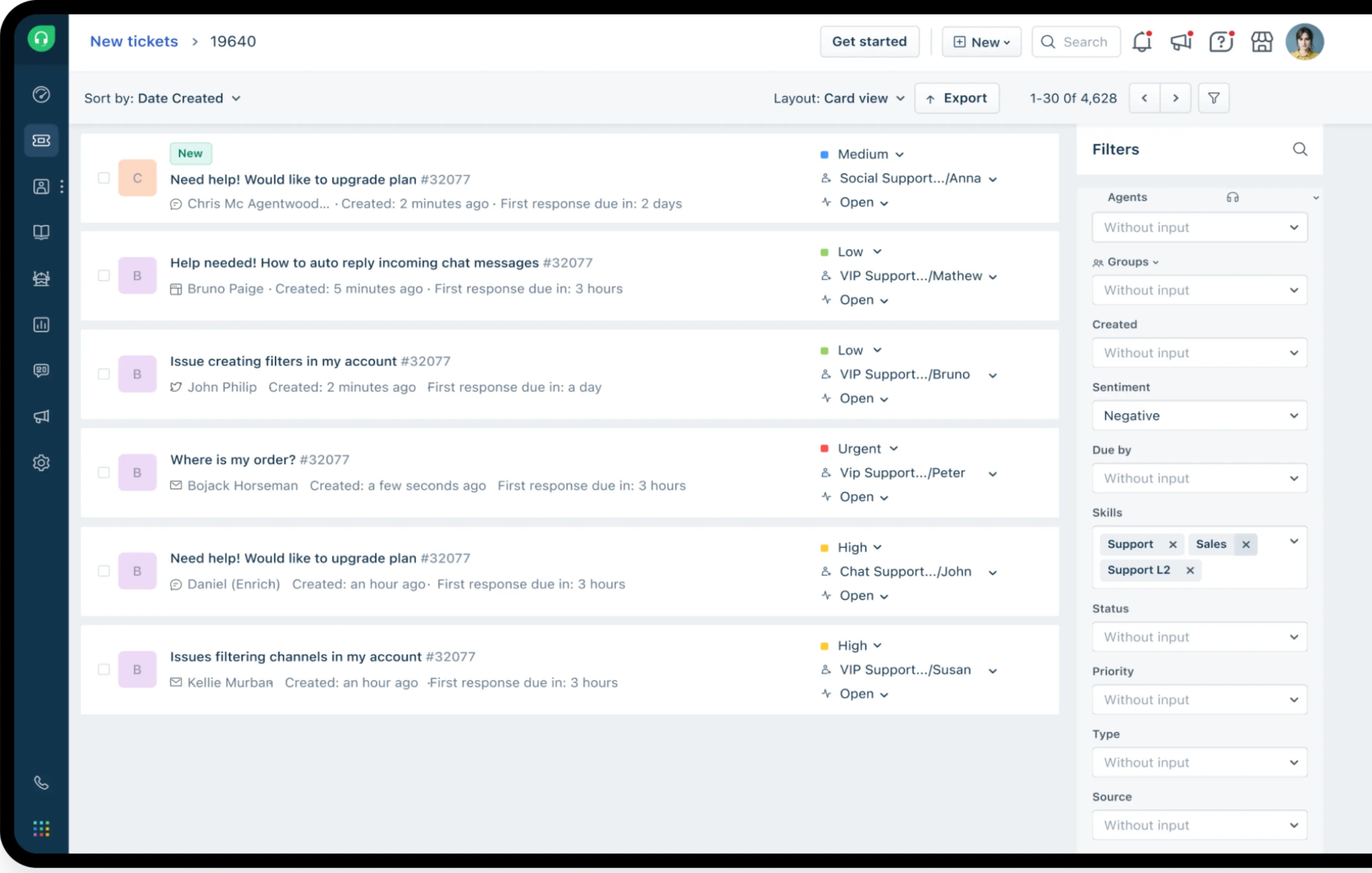
Businesses using Freshdesk can manage, prioritize, and resolve tickets with a unified workspace, delivering personalized support quickly. Thanks to a scalable knowledge base and custom widgets, organizations can automate self-service to help customers find answers by themselves. With AI-powered automation, customer support agents can improve their productivity and efficiency, delivering more accurate results.
Freshdesk pricing starts at $15 per user per month, providing an affordable solution for businesses seeking to enhance their customer support operations. However, Freshdesk's price structure can be confusing, especially for businesses with limited resources. Moreover, transitioning to higher tiers can pose a challenge for growing businesses due to substantial increases in prices.
5. ServiceNow Customer Service Management
ServiceNow CSM is a customer service management software, providing organizations with a unified platform to manage cases and deliver exceptional customer experiences. With self-service portals integrated with a knowledge base, AI-powered chatbots, and comprehensive case-tracking capabilities, ServiceNow empowers businesses to streamline case resolution processes and improve operational efficiency.
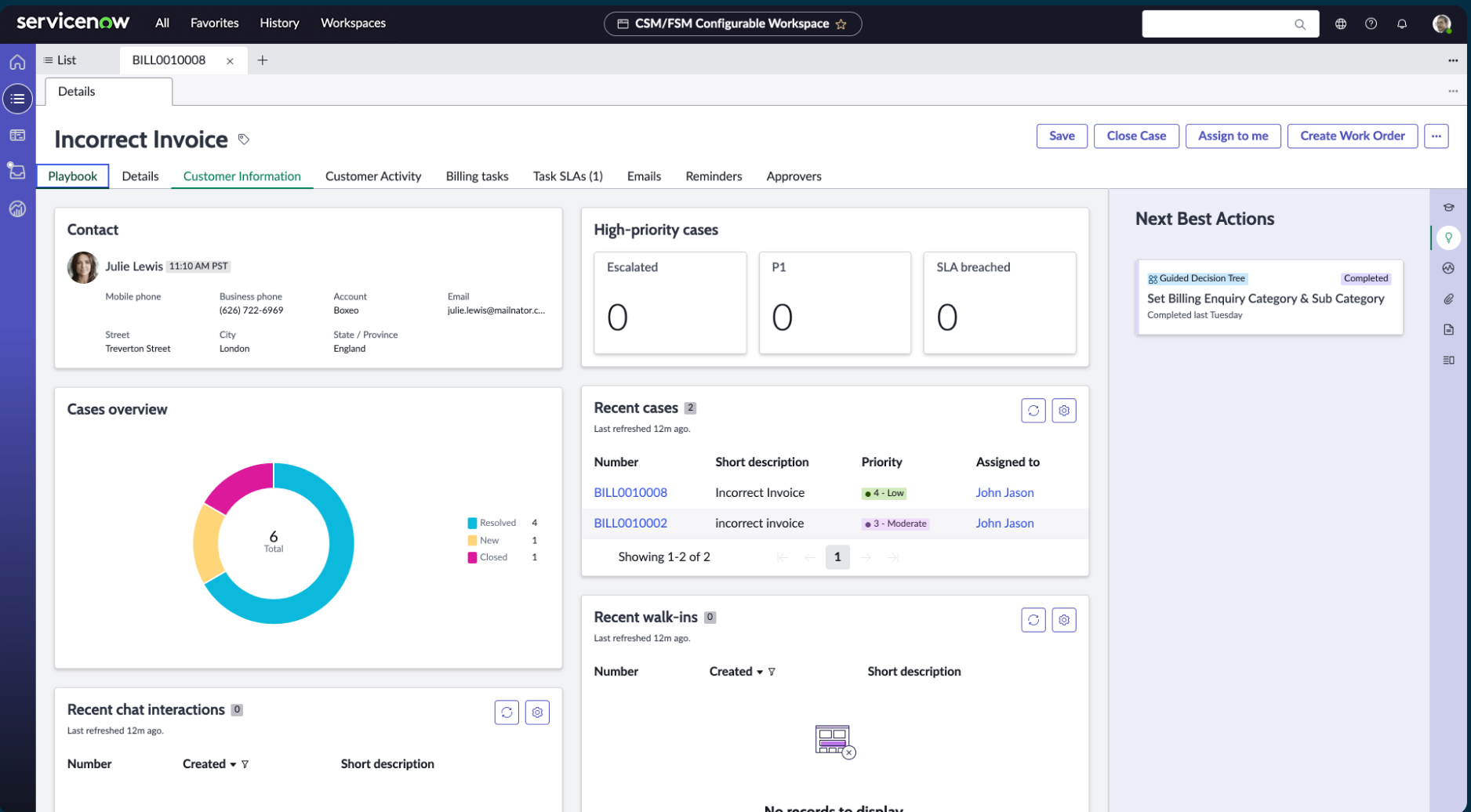
Its customizable workflows and real-time analytics enable organizations to optimize service delivery and exceed customer expectations. With next-best-action recommendations and omnichannel support across phone, messaging, chat, and more, agents can resolve cases more efficiently.
ServiceNow is an intuitive and easy-to-use platform, and according to users, the implementation is smooth thanks to great customer support delivered by the vendor. However, some users reported that the system can be slow, and the design is outdated.
Pricing for ServiceNow Customer Service Management is available upon request.
6. Clio
Tailored for law firms and legal professionals, Clio is a web-based case management software that simplifies legal workflows and enhances client collaboration. Its intuitive interface and robust features, including task automation, time tracking, and document management, streamline case-handling processes and improve efficiency.
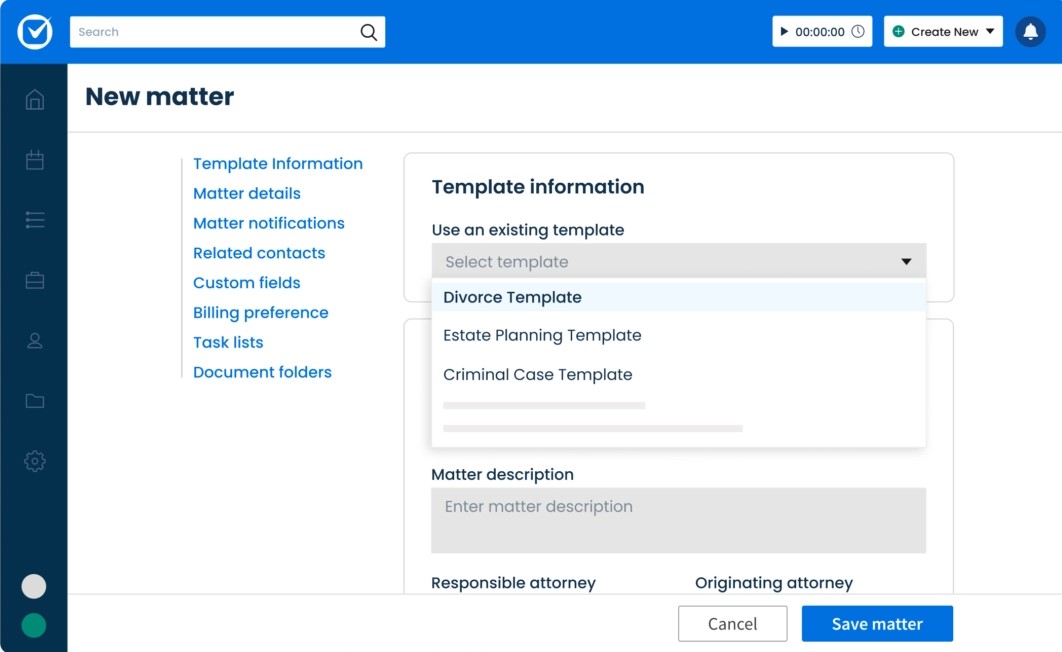
Integration with over 200 third-party applications, including payment platforms, marketing tools, and more, further enhances Clio's capabilities. However, according to users, Clio’s reporting features lack customization options, which can be limiting for firms with unique reporting requirements or those seeking deeper insights into case performance metrics.
With pricing starting at $39 per user per month, Clio is a solution suitable for medium to large legal practices.
7. CASEpeer
CASEpeer is a specialized case management software designed for personal injury law firms. It offers intuitive features for managing cases, clients, and settlements, including matter management, medical records integration, and expense tracking.
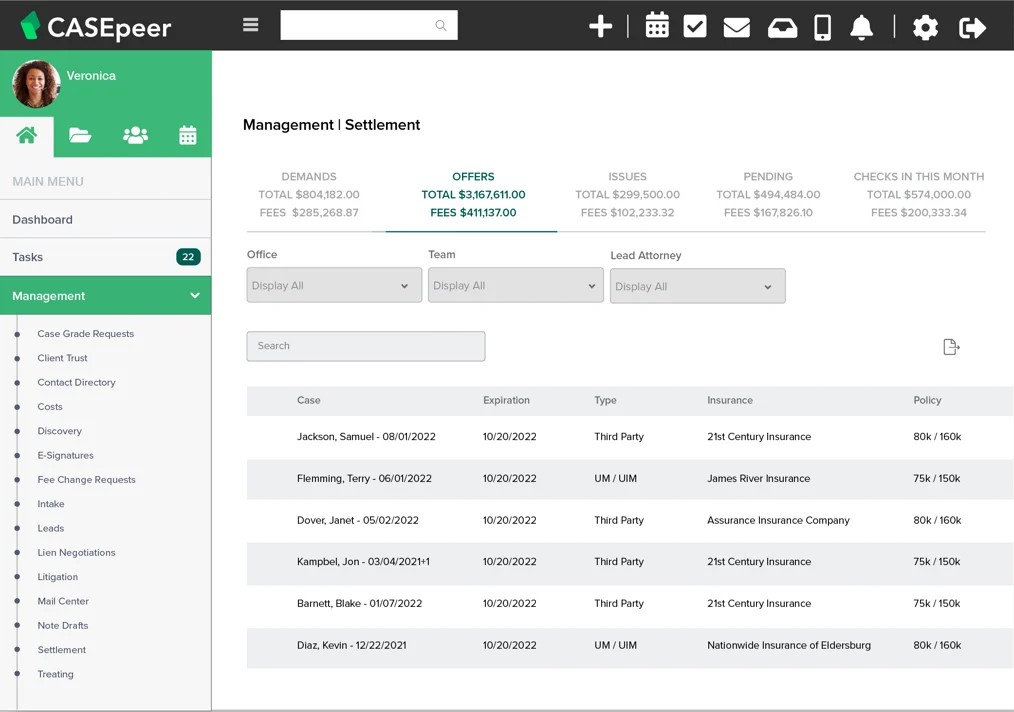
CASEpeer provides an easy-to-use platform with an intuitive interface to manage cases and track all information, activity, and communication in one place. With medical treatment management features, CASEpeer helps businesses log injuries, doctor visits, and payments, and track the status of records while ensuring that sensitive customer data is safe and secure.
Thanks to the cost-tracking capabilities, businesses can recover full out-of-pocket expenses on every case, and streamline communication with accounting, integrating with Soluno and Quickbooks Online. However, some users reported that the platform is quite slow and takes time to load documents, which might negatively impact customer experience.
With pricing plans starting at $79 per user per month, CASEpeer might be out of range for smaller businesses.
8. Casebook
Casebook is a case management software solution that offers customizable workflows and advanced analytics to optimize processes. Designed for human service organizations, Casebook helps nonprofits, private sector, and public organizations manage social work cases. With features such as case tracking, case notes, and routine task automation, it streamlines operations and drives efficiency.
Casebook is a cloud-based software that centralizes client care information enabling users to access client information from anywhere. It offers preloaded functionality that simplifies the customization process, reducing the implementation time. With powerful analytics and built-in reporting features, it enables organizations to generate data-rich reports. However, users report an initial learning curve and a lack of flexibility to tailor the platform to individual needs.
With flexible pricing options starting at $29 per user per month and multiple add-ons, Casebook ensures scalability and affordability for businesses of all sizes.
9. MyCase
MyCase is a cloud-based case management software designed for small to medium law firms, providing intuitive tools to manage cases, clients, and billing. Its features include calendaring, document management, secure client communication, and LawPay payments, enabling firms to streamline their workflows and improve client satisfaction.
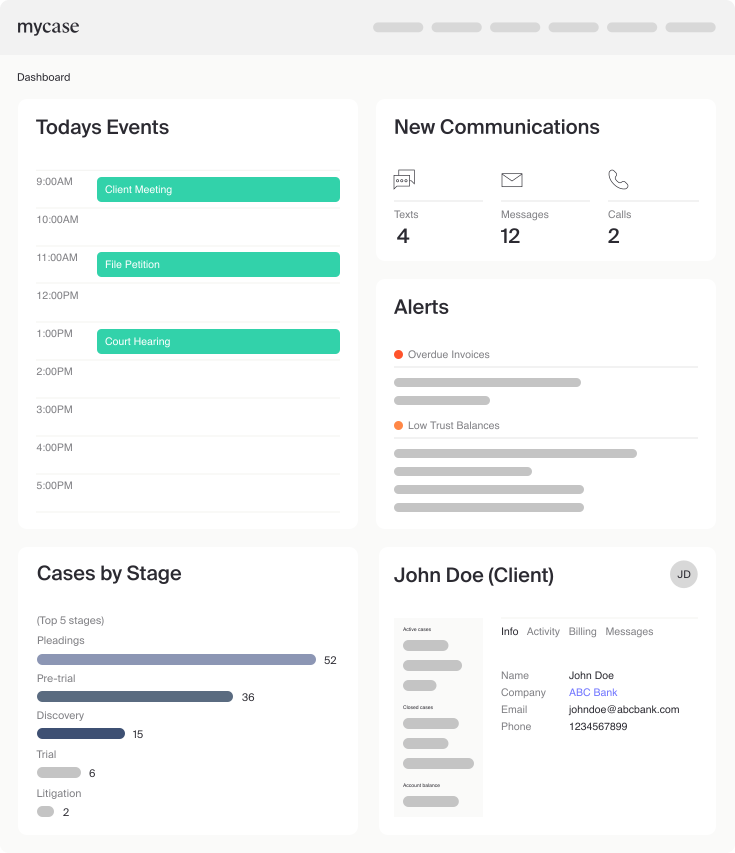
This software provides case status reports, client intake forms, accounting, contact management, and workflow automation. MyCase allows users to sync their calendars to collaborate on cases and track time and expenses. Some of its other functions include task management, reminders, case notes, and case analytics. However, according to users, billing and invoicing features could be improved. Additionally, the platform could benefit from more third-party integration and customization options.
With pricing starting at $39 per user per month, MyCase offers a cost-effective solution for legal practices.
10. Bonterra Case Management
Bonterra Case Management, formerly Apricot by Social Solutions, offers a robust and customizable solution for case management, focused on meeting the needs of nonprofit organizations.
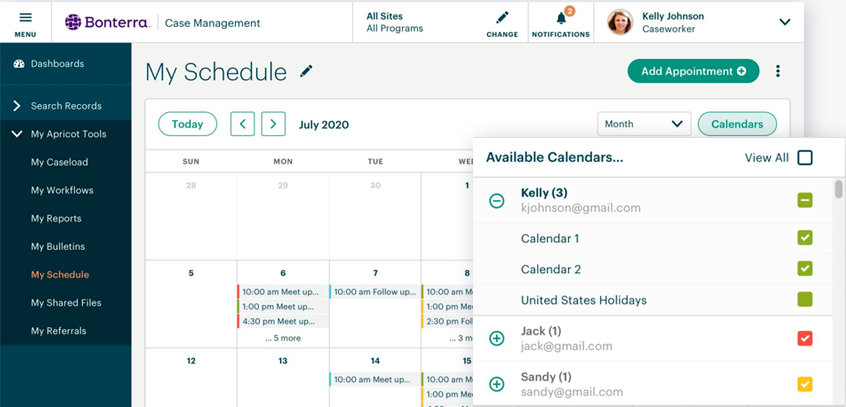
Bonterra is a user-friendly platform offering customizable forms and reports that can be built from scratch using click-and-drag functionalities. Its comprehensive features include program and client management, document automation, task tracking, and client collaboration tools, empowering firms to streamline their workflows and enhance productivity. Advanced reporting and analytics help organizations make data-driven decisions to maximize resources and grow impact across communities.
Pricing for Bonterra Case Management is available only upon request; however, users have reported high prices that create a barrier, particularly for small nonprofit organizations. Additionally, poor customer support makes implementation and onboarding challenging.
How to Choose the Right Case Management System?
Choosing the right case management system is crucial for optimizing operations and achieving business goals. Consider the following factors to make the right decision for your business:
- Identify your requirements - start by identifying your organization's specific requirements, including the type of cases you handle, workflow processes, integration needs, and the size of your team.
- Evaluate features - look for essential features such as case tracking, task management, document management, reporting, etc. Ensure that the system offers customization options to adapt to your unique needs.
- Ease of use - choose a user-friendly interface that’s easy to use and navigate, even for non-technical users. Look for a solution that offers no-code capabilities that simplify the implementation and customization processes.
- Integration capabilities - ensure compatibility with existing software systems, such as CRM, email, etc., to streamline workflows and data exchange.
- Data security - prioritize systems with robust security measures, including encryption, access controls, and compliance certifications, to protect sensitive customer information.
- Scalability - select a system that can grow with your organization, accommodating increasing case volumes and expanding user needs.
- Costs - evaluate pricing plans, including upfront costs and any additional charges for extra features or users.
By carefully considering these factors and conducting thorough research, you can choose a case management system that meets your organization's needs and fits within your budget.
Improving Customer Experience - The Role of Effective Case Management
In the realm of modern business, success lies in delivering exceptional customer experiences. Effective case management plays a pivotal role in achieving this goal by helping businesses resolve issues promptly and effectively. By implementing the right case management solution organizations can optimize workflows, enhance productivity, and ultimately elevate the customer experience.
Among the top case management software, Creatio stands out as the best solution, offering comprehensive functionality suitable for all businesses, regarding the industry and size. By leveraging the power of Creatio, organizations can optimize workflows, enhance productivity, and deliver excellent customer experience. Through efficient case handling, businesses can foster customer satisfaction and loyalty, ensuring sustained growth and long-term success.





